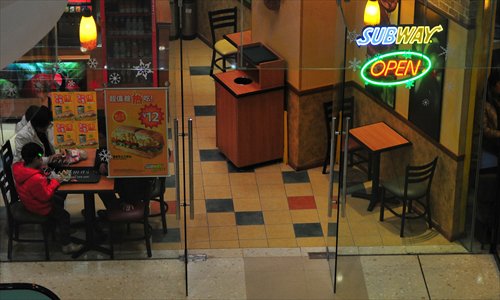Starbucks confirms use of chemical food additive in Chinese mainland, Subway and McDonald’s say otherwise

People eat inside a Subway store in Shenyang, Northeast China's Liaoning Province on Monday. Photo: CFP
US-based coffee chain Starbucks confirmed the use of a chemical substance known as azodicarbonamide in its food products in China, pledging the use of the additive as “legal.”
In a statement sent to the Global Times Monday night via e-mail, Starbucks said some pastries sold in its China stores contain wheat flour with the additive, which is fully compliant with local food safety regulations in China.
The e-mail pointed out that azodicarbonamide is an approved food additive for pastry production according to GB2760 China Food Additive Standard.
Starbucks made the announcement after foreign media reported that US consumers have been protesting fast-food restaurant Subway’s use of the chemical to enhance bread’s elasticity, but which poses a potential health hazard. According to CNN, the same chemical is also found in the bread products of other US chains such as McDonald’s and Starbucks in the US.
A McDonald’s representative contacted the Global Times by e-mail on Monday, saying there is no azodicarbonamide in its bread sold to the Chinese market.
Subway, one of the world’s largest fast-food chains, said Monday that the bread it uses in the Chinese mainland does not contain azodicarbonamide, calling for Chinese consumers to“rest assured.”
The news caused a stir among netizens when they discovered the same chemical is also used in making yoga mats and shoe soles.
“Azodicarbonamide is not present in any bread sold in Subway restaurants in the mainland. However, while it is fully approved by relevant government authorities in the US, this particular ingredient is already in the process of being removed from US bread,” Subway said on its official Sina Weibo account.
Some food safety experts were quoted by the National Business Daily (NBD) on Monday as saying that azodicarbonamide itself is safe, but it might release a chemical substance that causes cancer when being baked at high temperature.
According to the NBD, while the US, Brazil, and the Chinese mainland allow the legal use of azodicarbonamide in food making, it has already been banned in Singapore, Australia, Japan and the EU a long time ago due to its potential hazards.
In recent years, Western fast-food chain stores have expanded rapidly in China, lowering their threshold for franchise membership along the way.
Subway alone expanded from 355 stores to 400 stores during a period of nine months last year.